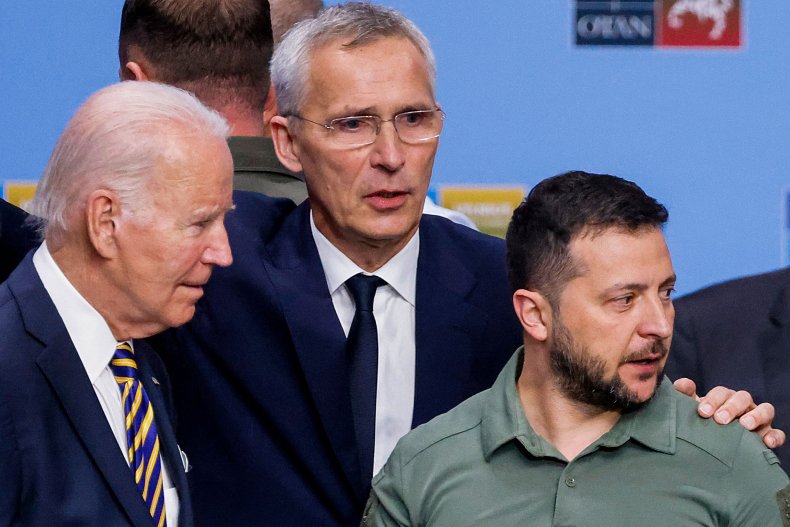NATO Chief Says Weakening Russia Will Help US Focus on Challenging China
by Tom O'Connor, Newsweek, Sep 21, 2023
The head of NATO asserted today that weakening Russia in Ukraine could allow the United States to intensify its efforts in countering China.
Speaking at an event hosted by the Council on Foreign Relations on the sidelines of the United Nations General Assembly in New York, NATO Secretary-General Jens Stoltenberg said Thursday that the primary goal of his visit "is to mobilize support for Ukraine." A victory for Kyiv in resisting the war launched by Moscow more than a year and a half ago is "in our security interest," Stoltenberg said.
The consequences of such a loss, he warned, would be felt beyond Europe and extend into Asia as well, where Chinese President Xi Jinping has vowed to retake the disputed island of Taiwan.
"It will be a tragedy for Ukraine if President [Vladimir] Putin wins, but it will also be extremely dangerous for us," Stoltenberg said. "It will make the world more dangerous and more vulnerable, because then the message to President Putin and also to President Xi is that when they use military force, when they violate the international order, when they invade another country, they get what they want."
"So, if the United States is concerned about China and wants to pivot towards Asia, then you have to ensure that Putin doesn't win in in Ukraine," he added, "because if Ukraine wins, then you will have the second biggest army in Europe, the Ukrainian army, battle-hardened, on our side, and we'll have a weakened Russian army, and we have also now Europe really stepping up for defense spending."
Such a scenario, Stoltenberg said, "will make it easier" for the U.S. "to focus also on China," as Washington can be "less concerned about the situation in Europe."

While NATO is a transatlantic alliance, the 31-member bloc has increasingly expanded its presence in the Asia-Pacific region, engaging with partners such as Australia, Japan and New Zealand. Under Stoltenberg, who will have presided over the coalition for at least a decade after his term was extended through next October, NATO has also enhanced its focus on China, whose diplomatic, economic and military power has accelerated rapidly throughout Xi's own past decade in power.
Stoltenberg made numerous mentions of China throughout his comments at the event Wednesday, including references to Beijing's robust partnership with Moscow. He dismissed the notion that security issues in Europe and Asia could be completely separated as "wrong, for many reasons, not least because we see Beijing and Moscow are coming more and more closely together."
The NATO chief noted the "no-limits" partnership declared by Putin and Xi just two weeks before Russia invaded Ukraine and the increasingly frequent joint aerial and naval patrols conducted by Chinese and Russian forces in the Asia-Pacific. He also took aim at China's position on the war in Ukraine, on which Beijing has remained officially neutral but has at times echoed Moscow's criticisms of NATO's post-Cold War expansion into Eastern Europe, viewed by the Kremlin as justification for the conflict.
"The reality is that China is supporting the Russian war effort by propping up the economy and also by spreading the Russian false narrative of what this war is about, this war of aggression against Ukraine," Stoltenberg said. "So, what happens in Europe, that matters for Asia, what happens in Asia matters for Europe."
"And that's one reason why countries like South Korea and Japan are extremely concerned about the war in Ukraine," he added, "because they know that if President Putin wins, it lowers the threshold for President Xi to use force."
Newsweek has reached out to Stoltenberg via the Council on Foreign Relations for comment.
Contacted for comment, Chinese Embassy to the United Nations spokesperson Liu Pengyu told Newsweek that Stoltenberg's remarks demonstrate that "more than 30 years after the Cold War ended" NATO's "legacy remains trapped in a zero-sum mindset and views the world as opposing blocs."
"Despite the global community's call for peace, development, and common progress, NATO continues to act against the prevailing trend and seek to turn back the wheel of history," he added.
Liu argued that, rather than the potential aggressor described by the NATO secretary-general, "China is a force for world peace, a contributor to global development, a defender of the international order, and a source of public good." Liu said that "China is committed to the international system with the UN at its core, the international order underpinned by international law and the basic norms governing international relations that stem from the purposes and principles of the UN Charter."
And "on the question of Ukraine," Liu argued, "we have worked actively to encourage all parties to seek a political solution."
"It is time that NATO should leave behind the outdated Cold War and zero-sum mentality. Instead of placing single-minded belief in military force for absolute security, NATO needs to reflect on its role in the Ukraine crisis and what responsibilities it should take," Liu said. "Instead of underscoring ideological differences and bloc confrontation, NATO needs to act truly constructively for world peace and stability."
Earlier this month, China's ambassador to Canada, Cong Peiwu, criticized NATO's decision to include language critical of China in its latest communique as well as the alliance's overtures in the Asia-Pacific region.
"NATO not only attacked and defamed China in their Communiqué, but the Alliance members also constantly reached beyond their geographical scope as laid down in its treaty to accelerate NATO's eastward expansion into the Asia-Pacific region," Cong wrote in a September 11 op-ed published in Canada's Esprit de Corps magazine. "After stirring up turmoil in Europe, NATO is now attempting to disrupt the Asia-Pacific region and the entire globe."
Cong added that "at the behest of the U.S., NATO is attempting to start a New Cold War in the Asia-Pacific region."

No comments:
Post a Comment